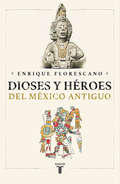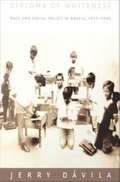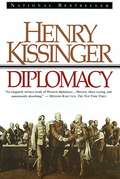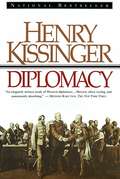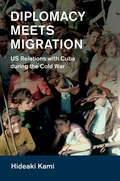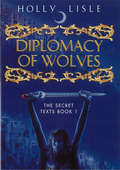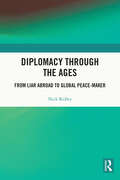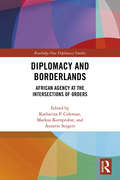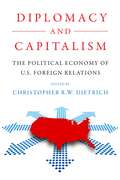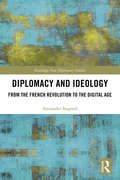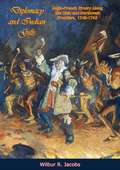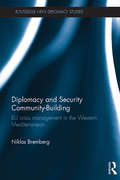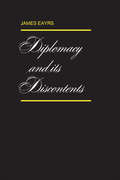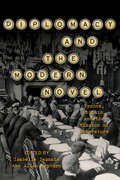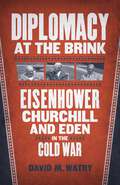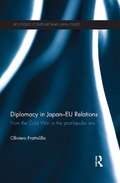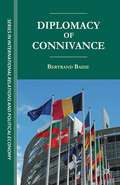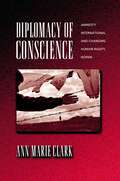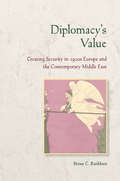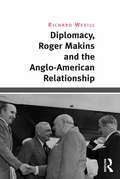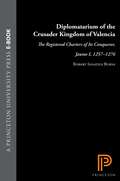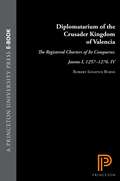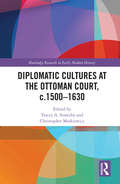- Table View
- List View
Dioses y héroes del México antiguo
by Enrique Florescano«Los símbolos de fertilidad, abundancia y poder que distinguen a la serpiente emplumada entre los olmecas, mayas y teotihuacanos perduraron en los reinos y culturas posteriores.» Este libro es un recorrido por los cimientos de la identidad de los pueblos mesoamericanos: los mitos fundadores, las divinidades que crearon y ordenaron el mundo, los ritos y la forma de organizar el tiempo, y, finalmente, los héroes legendarios. Es un recorrido, pues, por la memoria sagrada del México antiguo. Así como ocurre en los relatos de otras civilizaciones ancestrales, la creación del universo en los mitos mayas, mixtecos y nahuas comienza con un prólogo en el cielo: divinidades etéreas e inmortales hacen el mundo y a los seres humanos desde alturas remotas. Pero una vez cumplida esta misión primordial, los dioses creadores dejan su lugar a divinidades que tienen una relación más directa con las necesidades humanas. Es el caso de dos mitos fundamentales para el México prehispánico: el dios del maíz y la serpiente emplumada. El primero, además de representar el triunfo de la vida sobre la muerte, resume las virtudes de un pueblo campesino. La serpiente emplumada, por su parte, es símbolo de fertilidad, pero también de poder y realeza. Finalmente, el libro rastrea la huella histórica de algunos héroes de carne hueso: Ce Ácatl Topiltzin Quetzalcóatl, fundador y gobernante de Tula, y 8 Venado, guerrero notable que unificara toda la Mixteca. Esta obra resume el interés de toda una vida por el México prehispánico. Es ya un libro clave para entender la identidad del México antiguo y para explicar cómo la memoria ancestral cambia y se renueva en el presente.
Diploma of Whiteness: Race and Social Policy in Brazil, 1917-1945
by Jerry DávilaIn Brazil, the country with the largest population of African descent in the Americas, the idea of race underwent a dramatic shift in the first half of the twentieth century. Brazilian authorities, who had considered race a biological fact, began to view it as a cultural and environmental condition. Jerry Dvila explores the significance of this transition by looking at the history of the Rio de Janeiro school system between 1917 and 1945. He demonstrates how, in the period between the world wars, the dramatic proliferation of social policy initiatives in Brazil was subtly but powerfully shaped by beliefs that racially mixed and nonwhite Brazilians could be symbolically, if not physically, whitened through changes in culture, habits, and health. Providing a unique historical perspective on how racial attitudes move from elite discourse into people's lives, Diploma of Whiteness shows how public schools promoted the idea that whites were inherently fit and those of African or mixed ancestry were necessarily in need of remedial attention. Analyzing primary material--including school system records, teacher journals, photographs, private letters, and unpublished documents--Dvila traces the emergence of racially coded hiring practices and student-tracking policies as well as the development of a social and scientific philosophy of eugenics. He contends that the implementation of the various policies intended to "improve" nonwhites institutionalized subtle barriers to their equitable integration into Brazilian society.
Diplomacy
by Henry Kissinger'Kissinger's absorbing book tackles head-on some of the toughest questions of our time . . . Its pages sparkle with insight' Simon Schama in the NEW YORKER Spanning more than three centuries, from Cardinal Richelieu to the fragility of the 'New World Order', DIPLOMACY is the now-classic history of international relations by the former Secretary of State and winner of the Nobel Peace Prize. Kissinger's intimate portraits of world leaders, many from personal experience, provide the reader with a unique insight into what really goes on -- and why -- behind the closed doors of the corridors of power. 'Budding diplomats and politicians should read it as avidly as their predecessors read Machiavelli' Douglas Hurd in the DAILY TELEGRAPH 'If you want to pay someone a compliment, give them Henry Kissinger's DIPLOMACY ... It is certainly one of the best, and most enjoyable [books] on international relations past and present ... DIPLOMACY should be read for the sheer historical sweep, the characterisations, the story-telling, the ability to look at large parts of the world as a whole' Malcolm Rutherford in the FINANCIAL TIMES
Diplomacy (Política Y Derecho Ser.)
by Henry KissingerTHE SEMINAL WORK ON FOREIGN POLICY AND THE ART OF DIPLOMACY Moving from a sweeping overview of history to blow-by-blow accounts of his negotiations with world leaders, Henry Kissinger describes how the art of diplomacy has created the world in which we live, and how America's approach to foreign affairs has always differed vastly from that of other nations. Brilliant, controversial, and profoundly incisive, Diplomacy stands as the culmination of a lifetime of diplomatic service and scholarship. It is vital reading for anyone concerned with the forces that have shaped our world today and will impact upon it tomorrow.
Diplomacy Meets Migration: US Relations with Cuba during the Cold War (Cambridge Studies in US Foreign Relations)
by Hideaki KamiDiplomacy Meets Migration examines diplomacy, migration, and the history of US relations with Cuba during the Cold War. Hideaki Kami draws on declassified US and Cuban diplomatic sources, as well as Miami-Cuban lobby records, to challenge traditional interpretations that mainly focus on the two national capitals, Washington and Havana. By incorporating Miami into the story of foreign affairs, Kami assesses the intersection between migration and diplomacy, and considers how migration emerged as a critical issue that shaped the dynamism of US relations with Cuba. Kami demonstrates that the US government reformulated its Cuban policy in response to Fidel Castro's institutionalization of power, while simultaneously trying to build a new relationship with the Miami Cuban community, a new, politically mobilized constituency within US society. He shows how both migration control and migrant politics became important components of US foreign policy, which in turn influenced Cuban policy toward the United States.
Diplomacy Of Wolves
by Holly LisleKait Galweigh is a diplomat working to keep the Galweigh Family powerful, honourable and respected. Her particular task is to ensure that the arranged marriage of her flighty cousin, Tippa, is not compromised either by Tippa's own foolishness or by those who would see the Galweigh's fortunes founder.At a ball in celebration of the New Year and Tippa's marriage into the Dokteerak dynasty, Kait overhears the Paraglese of the Dokteerak and a member of the Sabir clan plotting against her Family. That she can hear the two men at all is thanks to a secret that she has kept hidden in fear of her life. Kait is a shape shifter who in moments of crisis will transform into a wolf. In her life as a diplomat this other self is a blessing and a curse - she can hear, see and smell with an acuity that show up the lies of politicians and kings, but her curse is that should she ever inadvertently reveal her skill, she will doom herself to a vicious death.
Diplomacy Through the Ages: From Liar Abroad to Global Peace-maker
by Nick RidleyThis book is a diplomatic history of Europe and the wider world over a period of 500 years, from the beginning of the sixteenth century to the early twenty-first century – with a crucial aspect. The book reflects upon the development of diplomacy and diplomats in changing from acting solely in the national interests of their respective countries to increasingly engaging in international conflict resolution and peace-making. It will be an invaluable reading for students and practitioners of international history, international relations and international security.
Diplomacy and Borderlands: African Agency at the Intersections of Orders (Routledge New Diplomacy Studies)
by Markus Kornprobst Katharina P. Coleman Annette SeegersThis book examines Africa’s internal and external relations by focusing on three core concepts: orders, diplomacy and borderlands. The contributors examine traditional and non-traditional diplomatic actors, and domestic, regional, continental, and global orders. They argue that African diplomats profoundly shape these orders by situating themselves within in-between-spaces of geographical and functional orders. It is in these borderlands that agency, despite all kinds of constraints, flourishes. Chapters in the book compare domestic orders to regional ones, and then continental African orders to global ones. They deal with a range of functional orders, including development, international trade, human rights, migration, nuclear arms control, peacekeeping, public administration, and territorial change. By focusing on these topics, the volume contributes to a better understanding of African international relations, sharpens analyses of ordering processes in world politics, and adds to our comprehension of how diplomacy shapes orders and vice versa. The studies collected here show a much more nuanced picture of African agency in African and international affairs and suggest that African diplomacy is far more extensive than is often assumed. This book will be of much interest to students of diplomacy studies, African politics and International Relations.
Diplomacy and Capitalism: The Political Economy of U.S. Foreign Relations (Power, Politics, and the World)
by Christopher R.W. DietrichAt the same time as modern capitalism became an engine of progress and a source of inequality, the United States rose to global power. Hence diplomacy and the forces of capitalism have continually evolved together and shaped each other at different levels of international, national, and local transformations. Diplomacy and Capitalism focuses on the crucial questions of wealth and power in the United States and the world in the twentieth century. Through a series of wide-ranging case studies on the history of international political economy and its array of state and non-state actors, the volume's authors analyze how material interests and foreign relations shaped each other. How did the rising and then disproportionate power of the United States and the actions of corporations, creditors, diplomats, and soldiers shape the twentieth-century world? How did officials in the United States and other nations understand the relationship between foreign investment and the state? How did people outside of the United States respond to and shape American diplomacy and political-economic policy? In detailed discussions of the exchanges and entanglements of capitalism and diplomacy, the authors answer these crucial questions. In doing so, they excavate how different combinations of material interest, geopolitical rivalry, and ideology helped create the world we live in today. The book thus analyzes competing and shared visions of international capitalism and U.S. diplomatic influence in chapters that bring the book's readers from the dawn of the twentieth century to its end, from Theodore Roosevelt to Ronald Reagan.Contributors: Abou Bamba, Giulia Crisanti, Christopher R. W. Dietrich, Max Paul Friedman, Joseph Fronczak, Alec Hickmott, Jennifer M. Miller, Alanna O'Malley, Nicole Sackley, Jayita Sarkar, Erum Sattar, Jason Scott Smith.
Diplomacy and Ideology: From the French Revolution to the Digital Age (Routledge New Diplomacy Studies)
by Alexander StagnellThis innovative new book argues that diplomacy, which emerged out of the French Revolution, has become one of the central Ideological State Apparatuses of the modern democratic nation-state. The book is divided into four thematic parts. The first presents the central concepts and theoretical perspectives derived from the work of Slavoj Žižek, focusing on his understanding of politics, ideology, and the core of the conceptual apparatus of Lacanian psychoanalysis. There then follow three parts treating diplomacy as archi-politics, ultra-politics, and post-politics, respectively highlighting three eras of the modern history of diplomacy from the French Revolution until today. The first part takes on the question of the creation of the term ‘diplomacy’, which took place during the time of the French Revolution. The second part begins with the effects on diplomacy arising from the horrors of the two World Wars. Finally, the third part covers another major shift in Western diplomacy during the last century, the fall of the Soviet Union, and how this transformation shows itself in the field of Diplomacy Studies. The book argues that diplomacy’s primary task is not to be understood as negotiating peace between warring parties, but rather to reproduce the myth of the state’s unity by repressing its fundamental inconsistencies. This book will be of much interest to students of diplomacy studies, political theory, philosophy, and International Relations.
Diplomacy and Indian Gifts: Anglo-French Rivalry Along the Ohio and Northwest Frontiers, 1748-1763 (Eastern Woodlands History And Culture Ser.)
by Wilbur R. JacobsThis study of gifts to the Indians is an attempt to illuminate a hitherto almost obscure factor in the Colonial westward movement. These “presents,” comprising such eighteenth-century items as fabrics, hardware, munitions, food, toys, jewelry, clothing, wampum, and liquors, were a potent factor in the complex diplomatic history of Indian politics along the old Northwest frontier. Thousands of pounds sterling were expended both by the French and by the English in observing this old Indian custom that was so necessary to Indian diplomacy. Indeed, the civilizing influence of this concomitant of Western culture reached ahead of the fur trade far into the wilderness to the Mississippi Valley. These so-called presents also served as a measure of compensation for the vast areas of virgin forest that were bought by the English. The French competed with the British in securing the friendship of the powerful Indian confederacies, which, even as late as 1750, held the balance of power in North America. During the years 1748-1763, it became the policy of the colonies bordering the Ohio and Northwest frontiers to “brighten the chain of friendship” by giving presents to such influential “nations” as the members of the Iroquoian confederacy. Moreover, in some cases the Indians became so accustomed to these frequent outlays of free merchandise that they came to be almost completely dependent upon European goods.—Wilbur R. Jacobs
Diplomacy and Security Community-Building: EU Crisis Management in the Western Mediterranean (Routledge New Diplomacy Studies)
by Niklas BrembergThis book contributes to the ongoing debate in IR on the role of security communities and formulates a new mechanism-based analytical framework. It argues that the question we need to ask is how security communities work at a time when armed conflicts among states have become significantly less frequent compared to other non-military threats and trans-boundary risks (e.g. terrorism and the adverse effects of climate change). Drawing upon recent advances in practice theory, the book suggests that the emergence and spread of cooperative security practices, ranging from multilateral diplomacy to crisis management, are as important for understanding how security communities work as more traditional confidence-building measures. Using the EU, Spain and Morocco as an in-depth case study, this volume reveals that through the institutionalization of multilateral venues, the EU has provided cooperative frameworks that otherwise would not have been available, and that the de-territorialized notion of security threats has created a new rationale for practical cooperation between Spanish and Moroccan diplomats, armed forces and civilian authorities. Within the broader context, this book provides a mechanism-based framework for studying regional organizations as security community-building institutions, and by utilizing that framework it shows how practice theory can be applied in empirical research to generate novel and thought-provoking results of relevance for the broader field of IR. This book will be of much interest to students of multilateral diplomacy, European Politics, foreign policy, security studies and IR in general.
Diplomacy and its Discontents
by James EayrsJames Eayrs is a keen and articulate observer of international politics. His incisive critiques of the moral turpitude and inefficiency of the diplomatic profession in Right and Wrong in Foreign Policy and Fate and Will in Foreign Policy provoked unflattering attention and attempts at rebuttal by the statesmen and politicians who shape our foreign policy. This volume makes these two controversial studies available once more, bringing them up to date with discussions of the 'October crisis' in Quebec and other recent events, and incorporating the author's selection of his recent writings on the irrelevance, or deliquescence, of modern diplomacy. All three parts of the book hold to a single theme – the decay of diplomatic method. In the incisive prose characteristic of all Eayrs' writing, these discourses present a convincing view of the tragi-comedy of foreign affairs. The general reader and the student of politics and international affairs will find this a perceptive analysis of statecraft, full of insights into the workings of government.
Diplomacy and the Modern Novel: France, Britain, and the Mission of Literature
by Isabelle Daunais and Allan HepburnBetween 1900 and 1960, many writers in France and Britain either had parallel careers in diplomatic corps or frequented diplomatic circles: Paul Claudel, Albert Cohen, Lawrence Durrell, Graham Greene, John le Carré, André Malraux, Nancy Mitford, Marcel Proust, and others. What attracts writers to diplomacy, and what attracts diplomats to publishing their experiences in memoirs or novels? Like novelists, diplomats are in the habit of describing situations with an eye for atmosphere, personalities, and looming crises. Yet novels about diplomats, far from putting a solemn face on everything, often devolve into comedy if not outright farce. Anachronistic yet charming, diplomats take the long view of history and social transformation, which puts them out of step with their times – at least in fiction. In this collection of essays, eleven contributors reflect on diplomacy in French and British novels, with particular focus on temporality, style, comedy, characterization, and the professional liabilities attached to representing a state abroad. With archival examples as evidence, the essays in this volume indicate that modern fiction, especially fiction about diplomacy, is a response to the increasing speed of communication, the decline of imperial power, and the ceding of old ways of negotiating to new.
Diplomacy at the Brink: Eisenhower, Churchill, and Eden in the Cold War
by David M. WatryA groundbreaking new study of Anglo-American relations during the Cold War, Diplomacy at the Brink argues for a reevaluation of Dwight D. Eisenhower's foreign policy toward allies and enemies alike. Contrary to his reputation as a level-headed moderate, the Eisenhower who emerges in David M. Watry's exhaustively researched book is a conservative ideologue, a leader whose aggressively anti-Communist and anticolonialist foreign policies represented a major shift away from the containment policy of the Truman presidency. Watry contends that Eisenhower worked closely with John Foster Dulles to engage in aggressive brinksmanship that diametrically opposed Winston Churchill's diplomacy of "peaceful coexistence." At a time when British economic interests favored cooperation with China, Eisenhower planned nuclear war against it; when Anthony Eden considered Gamal Abdel Nasser a Soviet agent and invaded Egypt, Eisenhower supported Arab nationalism and used economic and political blackmail to force Britain to withdraw. Such stances fractured the "special relationship" between America and Great Britain and played a vital role in the dissolution of the British Empire. Watry's thorough examination of the important clash of U.S.-U.K. foreign policy demonstrates that America's new anti-colonial policies and the unilateral use of American power against perceived Communist threats put Eisenhower and Dulles on a collision course with Churchill and Eden that rocked the world.
Diplomacy in Japan-EU Relations: From the Cold War to the Post-Bipolar Era (Routledge Contemporary Japan Series)
by Oliviero FrattolilloSince the 1950s, Japan-Europe relations have been characterised by a mutual coldness in terms of diplomatic dialogue, punctuated by a number of trade disputes. This book analyses the development of the political and diplomatic relationship between Japan and Europe, and shows that – especially during the Cold War years – whilst they share a wide range of political values and goals, the quality of diplomatic relations has often been sacrificed to both overcome trade issues and as a result of systemic factors. Focusing on the institutionalization of relations between Japan and the EU, this book examines both the historical-diplomatic dimension and political-strategic discourse. It traces the historical development of the relationship from the post-war years, to the signing of the Japan-EU action plan in 2001, which marked a key turning point in the relationship. It goes on to examine the achievements and criticisms of ASEM, the Asia-Europe Meeting, which whilst meeting successfully for the past sixteen years, has also been condemned as little more than a talking shop. Crucially, Oliviero Frattolillo’s analysis clearly demonstrates how the interaction between Japan and the EU has been constructed on the basis of their perceptions of each other, thus underlining the inherent impact of different political identities, cultures and values on international relations. Providing a keen insight into Japan-EU relations, this book will appeal to students and scholars of Japanese and European history and politics, as well as those interested in the history of international relations and security studies.
Diplomacy in Renaissance Rome
by Catherine FletcherDiplomacy in Renaissance Rome is an investigation of Renaissance diplomacy in practice. Presenting the first book-length study of this subject for sixty years, Catherine Fletcher substantially enhances our understanding of the envoy's role during this pivotal period for the development of diplomacy. Uniting rich but hitherto unexploited archival sources with recent insights from social and cultural history, Fletcher argues for the centrality of the papal court - and the city of Rome - in the formation of the modern European diplomatic system. The book addresses topics such as the political context from the return of the popes to Rome, the 1454 Peace of Lodi and after 1494 the Italian Wars; the assimilation of ambassadors into the ceremonial world; the prescriptive literature; trends in the personnel of diplomacy; an exploration of travel and communication practices; the city of Rome as a space for diplomacy; and the world of gift-giving.
Diplomacy of Connivance (The Sciences Po Series in International Relations and Political Economy)
by B. BadieThe status quo of the modern world order, a diplomatic entente best characterized as "connivance diplomacy," is limited in its performances, defensive of its privileges, midway between competition and cooperation. It is examined here through its history, its functions, and its failures.
Diplomacy of Conscience: Amnesty International and Changing Human Rights Norms
by Ann Marie ClarkA small group founded Amnesty International in 1961 to translate human rights principles into action. Diplomacy of Conscience provides a rich account of how the organization pioneered a combination of popular pressure and expert knowledge to advance global human rights. To an extent unmatched by predecessors and copied by successors, Amnesty International has employed worldwide publicity campaigns based on fact-finding and moral pressure to urge governments to improve human rights practices. Less well known is Amnesty International's significant impact on international law. It has helped forge the international community's repertoire of official responses to the most severe human rights violations, supplementing moral concern with expertise and conceptual vision. Diplomacy of Conscience traces Amnesty International's efforts to strengthen both popular human rights awareness and international law against torture, disappearances, and political killings. Drawing on primary interviews and archival research, Ann Marie Clark posits that Amnesty International's strenuously cultivated objectivity gave the group political independence and allowed it to be critical of all governments violating human rights. Its capacity to investigate abuses and interpret them according to international standards helped it foster consistency and coherence in new human rights law. Generalizing from this study, Clark builds a theory of the autonomous role of nongovernmental actors in the emergence of international norms pitting moral imperatives against state sovereignty. Her work is of substantial historical and theoretical relevance to those interested in how norms take shape in international society, as well as anyone studying the increasing visibility of nongovernmental organizations on the international scene.
Diplomacy's Value: Creating Security in 1920s Europe and the Contemporary Middle East
by Brian C. RathbunWhat is the value of diplomacy? How does it affect the course of foreign affairs independent of the distribution of power and foreign policy interests? Theories of international relations too often implicitly reduce the dynamics and outcomes of diplomacy to structural factors rather than the subtle qualities of negotiation. If diplomacy is an independent effect on the conduct of world politics, it has to add value, and we have to be able to show what that value is. In Diplomacy's Value, Brian C. Rathbun sets forth a comprehensive theory of diplomacy, based on his understanding that political leaders have distinct diplomatic styles--coercive bargaining, reasoned dialogue, and pragmatic statecraft. Drawing on work in the psychology of negotiation, Rathbun explains how diplomatic styles are a function of the psychological attributes of leaders and the party coalitions they represent. The combination of these styles creates a certain spirit of negotiation that facilitates or obstructs agreement. Rathbun applies the argument to relations among France, Germany, and Great Britain during the 1920s as well as Palestinian-Israeli negotiations since the 1990s. His analysis, based on an intensive analysis of primary documents, shows how different diplomatic styles can successfully resolve apparently intractable dilemmas and equally, how they can thwart agreements that were seemingly within reach.
Diplomacy, Roger Makins and the Anglo-American Relationship
by Richard WevillThe history of Britain after the Second World War is essentially the story of her loss of great power status. Writers discussing this decline often focus on those sources of power which are tangible and capable of measurement: the size of a country’s armed forces, her Gross Domestic Product, or her energy reserves. But there are other real sources of power which are not so easily measured. The morale of a nation, the quality, integrity and stability of a country’s political system and a nation’s sense of unity are all intangible elements. So is diplomatic skill, which is central to the ability of one country to influence another. Roger Makins, the British Ambassador to Washington 1953-1956, was one of the most prominent and powerful diplomats of his time. His career was unusual for a Foreign Office official, in that such a large part of it took place in Washington and London, and was centred on Anglo-American relationships. This book describes his life, times and the important players he dealt with on both sides of the Atlantic. It is history seen through the perspective of the officials trying to serve their countries’ interests, and as such it sheds a new light on how the ’special relationship’ between Britain and America developed. It also shows the impact on policy a civil servant, who worked and negotiated with almost every important American and British politician and official of his time, can have.
Diplomatarium of the Crusader Kingdom of Valencia: The Registered Charters of Its Conqueror, Jaume I, 1257-1276. III: Transition in Crusader Valencia: Years of Triumph, Years of War, 1264-1270
by Robert Ignatius BurnsIn this volume, a panoramic history of medieval Valencia continues to unfold, as the noted scholar Robert Burns presents a new set of documents from the registers of Jaume the Conqueror at the Crown Archives in Barcelona. Here Burns focuses on 500 government charters covering the years 1264 to 1270, the culmination of the king's warrior fame in Christendom, and places these documents within the context of Jaumes's pan-Mediterranean military and political exploits. The most impressive archives of its kind outside the papal series, this collection is invaluable to medievalists as well as to historians interested in topics ranging from colonialism to rhetoric to economics during the Crusade period. Together the five Diplomatarium volumes will reconstruct the thousands of charters describing the daily business of Jaumes's kingdom and will provide detailed paraphrases of each document to aid scholars with little or no Latin. The third volume describes Jaume distributing public baths and taverns and artisans' quarters, constructing irrigation networks and castles, licensing butchers and physicians, noticing even dovecotes and beehives and oranges, operating on credit and on charismatic itinerant presence, interacting with his many Jewish and Muslim communities, and leading his armies to battle. Meanwhile, Jaumes's bureaucrats are at work elaborating a Roman law framework, shaping an institutional and commercial system, and defining the kingdom's religious identity. In a kaleidoscope of human detail, these documents open a window on an exotic past that medievalists and all historians can enjoy.
Diplomatarium of the Crusader Kingdom of Valencia: The Registered Charters of Its Conqueror, Jaume I, 1257-1276. IV: Unifying Crusader Valencia, The Central Years of Jaume the Conqueror
by Robert Ignatius BurnsThis fourth volume in Robert Burns's celebrated series on the warrior King Jaume the Conqueror's Kingdom of Valencia describes the crucial years of 1270 to 1273, a period during which Jaume continued his consolidation of political power for future territorial expansion. Here in the colonial kingdom that he carved out from the Islamic Mediterranean regions of coastal Spain, Jaume presided over a society more complex than any in Christendom. This lively frontier was home to semiautonomous communities of Muslims, Jews, and Christian settlers. Jaume's pioneering exploitation of Valencia's Islamic paper mills left behind thousands of charters--records in the king's registers--that provide a wealth of detailed information about every aspect of these parallel cultures. Burns's Diplomatarium volumes represent the first systematic exploration of this massive deployment of paper in the West. They open up to readers the rich humanistic panorama of medieval life as seen from the traveling court of a conqueror king. The 500 charters collected in this book cover a kaleidoscope of topics, including public baths, castles, the renaissance of law, irrigation, mosques and monasteries, hospitals and banks, even exotic women. There are records on crossbow manufacture, riot and fire control, ship launchers, dogs of war, crime, slavery, prisons, and pardons. This critical edition includes reconstructions of each charter in its original Latin or Romance language with a corresponding translation in English, making it invaluable for students and scholars alike.
Diplomatic Counterinsurgency
by Philippe Leroux-MartinWar does not stop when the armed conflict ends. This compelling eyewitness account of a key political crisis in Bosnia and Herzegovina in 2007 demonstrates how interventions from foreign powers to end armed conflict can create new forms of conflict that are not only as determined and resilient, but can lead groups to challenge the power of fragile states through political and legal means. Countering such challenges is an integral but often ignored part of peace processes. How do these nonviolent wars evolve? How can the power of fragile states be challenged through nonviolent means in the aftermath of armed conflict? And what is the role of diplomacy in countering such challenges? This book offers key insights for policy makers dealing with fragile states who seek answers to such questions.
Diplomatic Cultures at the Ottoman Court, c.1500–1630
by Tracey A. Sowerby; Christopher MarkiewiczIn the sixteenth century, the Ottoman court in Constantinople emerged as the axial centre of early modern diplomacy in Eurasia. Diplomatic Cultures at the Ottoman Court, c.1500-1630 takes a unique approach to diplomatic relations by focusing on how diplomacy was conducted and diplomatic cultures forged at a single court: the Sublime Porte. It unites studies from the perspectives of European and non-European diplomats with analyses from the perspective of Ottoman officials involved in diplomatic practices. It focuses on a formative period for diplomatic procedure and Ottoman imperial culture by examining the introduction of resident embassies on the one hand, and on the other, changes in Ottoman policy and protocol that resulted from the territorial expansion and cultural transformations of the empire in the sixteenth century. The chapters in this volume approach the practices and processes of diplomacy at the Ottoman court with special attention to ceremonial protocol, diplomatic sociability, gift-giving, cultural exchange, information gathering, and the role of para-diplomatic actors.
